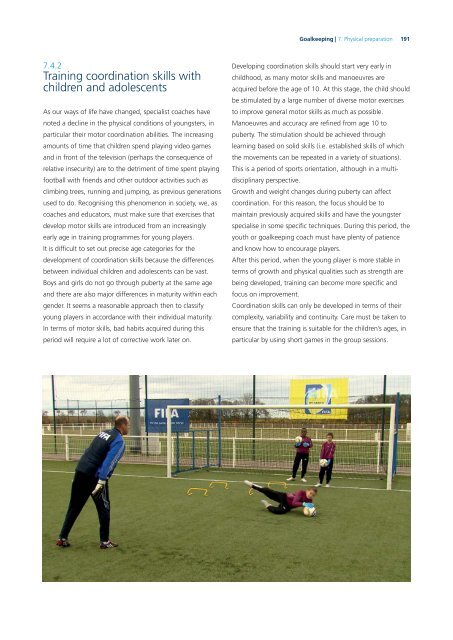Goalkeeping-bok
Goalkeeping-bok
Goalkeeping-bok
Create successful ePaper yourself
Turn your PDF publications into a flip-book with our unique Google optimized e-Paper software.
7.4.2<br />
Training coordination skills with<br />
children and adolescents<br />
As our ways of life have changed, specialist coaches have<br />
noted a decline in the physical conditions of youngsters, in<br />
particular their motor coordination abilities. The increasing<br />
amounts of time that children spend playing video games<br />
and in front of the television (perhaps the consequence of<br />
relative insecurity) are to the detriment of time spent playing<br />
football with friends and other outdoor activities such as<br />
climbing trees, running and jumping, as previous generations<br />
used to do. Recognising this phenomenon in society, we, as<br />
coaches and educators, must make sure that exercises that<br />
develop motor skills are introduced from an increasingly<br />
early age in training programmes for young players.<br />
It is diffi cult to set out precise age categories for the<br />
development of coordination skills because the differences<br />
between individual children and adolescents can be vast.<br />
Boys and girls do not go through puberty at the same age<br />
and there are also major differences in maturity within each<br />
gender. It seems a reasonable approach then to classify<br />
young players in accordance with their individual maturity.<br />
In terms of motor skills, bad habits acquired during this<br />
period will require a lot of corrective work later on.<br />
<strong>Goalkeeping</strong> | 7. Physical preparation<br />
191<br />
Developing coordination skills should start very early in<br />
childhood, as many motor skills and manoeuvres are<br />
acquired before the age of 10. At this stage, the child should<br />
be stimulated by a large number of diverse motor exercises<br />
to improve general motor skills as much as possible.<br />
Manoeuvres and accuracy are refi ned from age 10 to<br />
puberty. The stimulation should be achieved through<br />
learning based on solid skills (i.e. established skills of which<br />
the movements can be repeated in a variety of situations).<br />
This is a period of sports orientation, although in a multidisciplinary<br />
perspective.<br />
Growth and weight changes during puberty can affect<br />
coordination. For this reason, the focus should be to<br />
maintain previously acquired skills and have the youngster<br />
specialise in some specifi c techniques. During this period, the<br />
youth or goalkeeping coach must have plenty of patience<br />
and know how to encourage players.<br />
After this period, when the young player is more stable in<br />
terms of growth and physical qualities such as strength are<br />
being developed, training can become more specifi c and<br />
focus on improvement.<br />
Coordination skills can only be developed in terms of their<br />
complexity, variability and continuity. Care must be taken to<br />
ensure that the training is suitable for the children’s ages, in<br />
particular by using short games in the group sessions.


